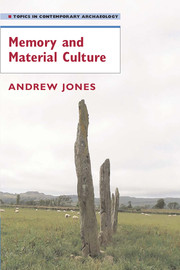Book contents
- Frontmatter
- Contents
- Preface
- 1 Memory and Material Culture?
- 2 From Memory to Commemoration
- 3 People, Time, and Remembrance
- 4 Improvising Culture
- 5 Continuous Houses, Perpetual Places: Commemoration and the Lives of Neolithic Houses
- 6 Culture, Citation, and Categorisation: Regionality in Late Neolithic Britain and Ireland
- 7 Chains of Memory: The Aesthetics of Memory in Bronze Age Britain
- 8 The Art of Memory: Memory, Inscription, and Place
- 9 Tracing the Past: Landscape, Lines, and Places
- 10 Coda
- References
- Index
10 - Coda
Published online by Cambridge University Press: 07 December 2009
- Frontmatter
- Contents
- Preface
- 1 Memory and Material Culture?
- 2 From Memory to Commemoration
- 3 People, Time, and Remembrance
- 4 Improvising Culture
- 5 Continuous Houses, Perpetual Places: Commemoration and the Lives of Neolithic Houses
- 6 Culture, Citation, and Categorisation: Regionality in Late Neolithic Britain and Ireland
- 7 Chains of Memory: The Aesthetics of Memory in Bronze Age Britain
- 8 The Art of Memory: Memory, Inscription, and Place
- 9 Tracing the Past: Landscape, Lines, and Places
- 10 Coda
- References
- Index
Summary
Central to the approach I have established throughout the book is the significance of participation and engagement. My principal cue for this comes from Merleau-Ponty's ‘reversibility thesis’ (Merleau-Ponty 1962). Merleau-Ponty argues for a perceptual connectivity between person and world. People are positioned in relation to the world they perceive; objects in the world reflect the position of the person. We can touch and be touched, see and be seen, act upon things and at the same time be acted upon by them – all this is due to our common fabric as ‘flesh’ (Olsen 2003, 98). Memory occurs as the person engages with the objects they encounter in the world they perceive; people remember as they are remembered by things. The habitual encounter with the phenomena of the world generates meaning, as the other philosopher of engagement, Charles Sanders Peirce, makes clear. The role of engagement lies at the heart of the philosophy of pragmatism: the meaning of things is determined by our perceptual engagement with them. While perceptual engagement is critical to remembrance, my approach to memory is essentially ecological in the terms described by David Rubin. Rubin (1988) argues that there is a psychological distinction between structure and process. We can consider accounts of memory as either ‘complex structure’ accounts or ‘complex process’ accounts. The problems arise when psychologists mistake complex processes for complex mental structures – effectively mapping events and processes that go on outside the mind onto the structure of the mind; as if real world events can be copied into, and then later explained, by the structure of the mind (Rubin 1988, 375).
- Type
- Chapter
- Information
- Memory and Material Culture , pp. 223 - 228Publisher: Cambridge University PressPrint publication year: 2007



